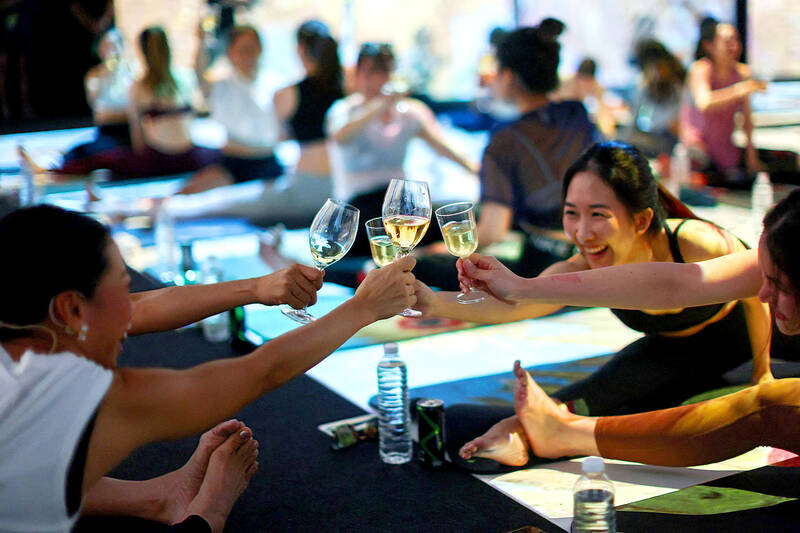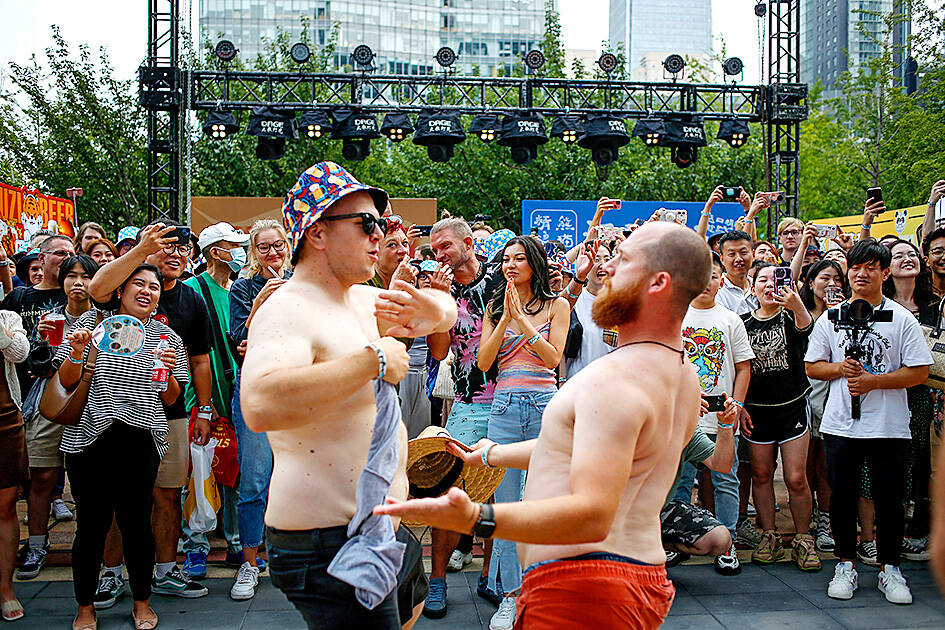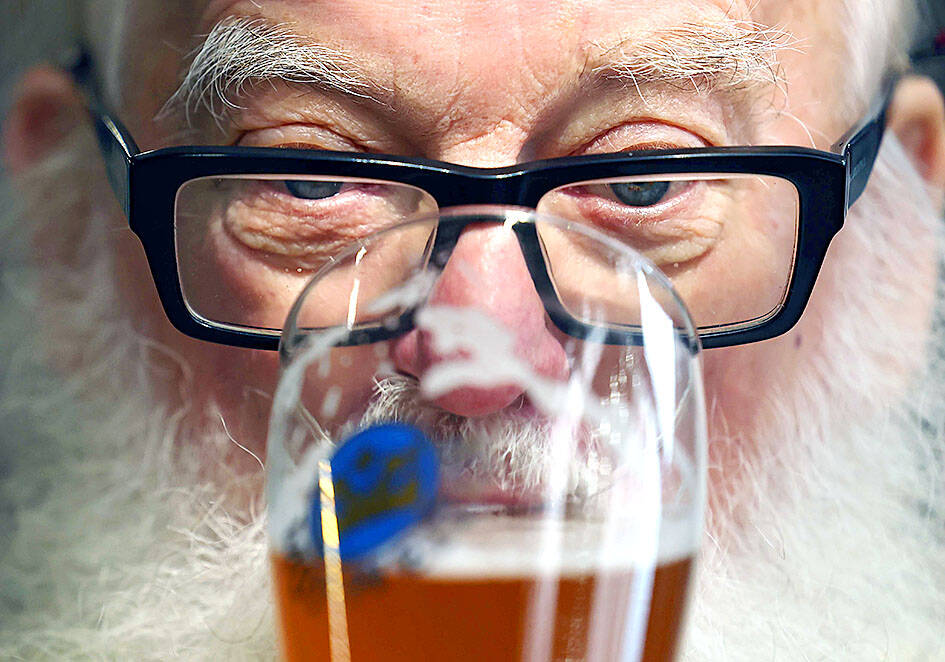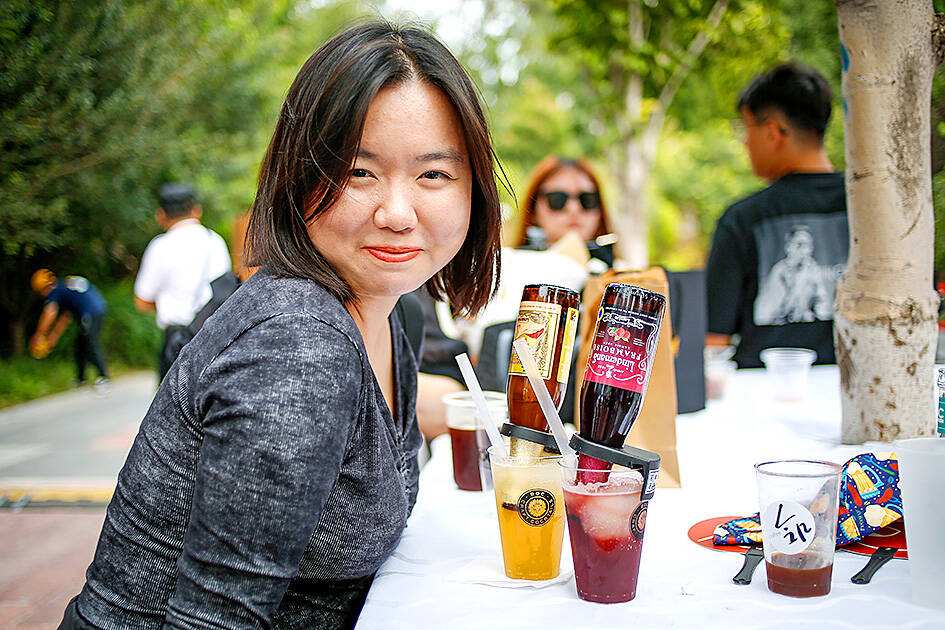If you thought beauty was in the eye of the beer holder, think again. Scientists have poured cold water — or rather, vodka — on the existence of “beer goggles”: the idea that alcohol makes other people appear better looking. However, it may arm you with the “liquid courage” to approach attractive people, the research suggests.
The term “beer goggles” is said to have been coined by male North American university students in the 1980s. Yet despite anecdotal evidence for the phenomenon, the link between alcohol intoxication and physical attraction has not been systematically studied.
Previous research, which has typically involved asking people to rate other people’s attractiveness by assessing photos when sober and intoxicated, has produced mixed results. Taken together, these studies indicated that if the beer goggles effect did exist, its magnitude was small, said Molly Bowdring at the Stanford Prevention Research Center in Palo Alto, California, who led the latest research.

Photo: Reuters
The new study added an additional dimension: the possibility of actually meeting some of the people participants had previously rated.
“By making participants believe that the pictures they were viewing were of people they could choose to interact with in the future, the research team have added a nice element of realism, which has been missing from previous research in this area,” said Rebecca Monk, a professor of psychology at Edge Hill University in Ormskirk, Lancashire, who was not involved in the study. “Their paradigm also allows for an exploration of the liquid courage adage rather than solely the so-called beer goggles phenomenon.”
Bowdring and Michael Sayette of the University of Pittsburgh invited 18 pairs of male friends into the laboratory to rate the attractiveness of men and women they viewed in photos and videos. The reasons for inviting friend pairs was to try to mimic the social interactions that might typically occur in a real drinking situation.

Photo: EPA-EFE
On one occasion, both men were given enough vodka and cranberry juice to raise their blood alcohol concentration to about 0.08 percent — the legal limit for driving in England, Wales and Northern Ireland and many US states — and on the other occasion, they both received a non-alcoholic beverage.
After providing attractiveness ratings for the photos, they were asked to select which of these individuals they would most like to interact with in a future experiment.
The research, published in the Journal of Studies on Alcohol and Drugs, did not find that alcohol increased people’s perceptions of others’ attractiveness.

Photo: EPA-EFE
“But we did find that people were more likely to select to interact with the people they perceived to be most attractive after consuming alcohol,” Bowdring said.
Indeed, drunk participants were 1.71 times more likely to select one of their top four attractive candidates to potentially meet in a future study, compared with when they were sober.
“Their findings essentially suggest that while intoxication may not have resulted in beer goggles, it did seem to increase liquid courage, in that people were more likely to indicate a desire to interact with attractive others,” said Monk, whose previous research had found some evidence to support the beer goggles effect.

Photo: EPA-EFE
In this study, UK undergraduates were asked to perform a computer-based task while ignoring photos of attractive and unattractive faces. It found that while sober participants were more distracted by attractive faces, those who were “lightly intoxicated” were equally distracted by attractive and less attractive faces.
Monk added that different methodological approaches may explain some of these mixed findings; to move on, the field needs larger studies to see if they can be replicated.
Given alcohol’s effects on visual processing and cognitive function, it was also possible that the results would change at heightened levels of intoxication, Monk said.
Assuming alcohol does enhance the likelihood of a person interacting with someone they find attractive, Bowdring believes her findings could reveal one process underpinning the rewarding yet potentially hazardous nature of alcohol — including its impact on risky sexual behavior.
“If you’re going to consume alcohol, I think it is worth reflecting on how can you do it in a way that’s safe and consistent with your goals,” she said. “People may benefit by recognizing that valued social motivations and intentions change when drinking, in ways that may be appealing in the short term but possibly harmful in the long term.”

Climate change, political headwinds and diverging market dynamics around the world have pushed coffee prices to fresh records, jacking up the cost of your everyday brew or a barista’s signature macchiato. While the current hot streak may calm down in the coming months, experts and industry insiders expect volatility will remain the watchword, giving little visibility for producers — two-thirds of whom farm parcels of less than one hectare. METEORIC RISE The price of arabica beans listed in New York surged by 90 percent last year, smashing on Dec. 10 a record dating from 1977 — US$3.48 per pound. Robusta prices have

The resignation of Taiwan People’s Party (TPP) co-founder Ko Wen-je (柯文哲) as party chair on Jan. 1 has led to an interesting battle between two leading party figures, Huang Kuo-chang (黃國昌) and Tsai Pi-ru (蔡壁如). For years the party has been a one-man show, but with Ko being held incommunicado while on trial for corruption, the new chair’s leadership could be make or break for the young party. Not only are the two very different in style, their backgrounds are very different. Tsai is a co-founder of the TPP and has been with Ko from the very beginning. Huang has

A few years ago, getting a visa to visit China was a “ball ache,” says Kate Murray. The Australian was going for a four-day trade show, but the visa required a formal invitation from the organizers and what felt like “a thousand forms.” “They wanted so many details about your life and personal life,” she tells the Guardian. “The paperwork was bonkers.” But were she to go back again now, Murray could just jump on the plane. Australians are among citizens of almost 40 countries for which China now waives visas for business, tourism or family visits for up to four weeks. It’s

A dozen excited 10-year-olds are bouncing in their chairs. The small classroom’s walls are lined with racks of wetsuits and water equipment, and decorated with posters of turtles. But the students’ eyes are trained on their teacher, Tseng Ching-ming, describing the currents and sea conditions at nearby Banana Bay, where they’ll soon be going. “Today you have one mission: to take off your equipment and float in the water,” he says. Some of the kids grin, nervously. They don’t know it, but the students from Kenting-Eluan elementary school on Taiwan’s southernmost point, are rare among their peers and predecessors. Despite most of